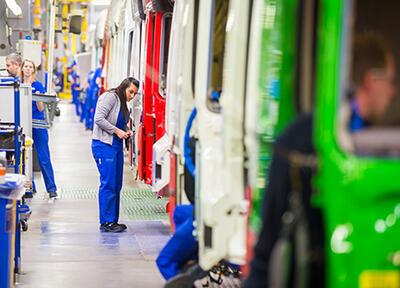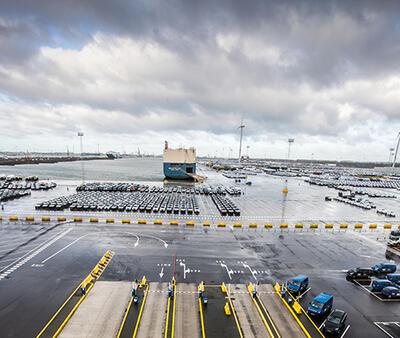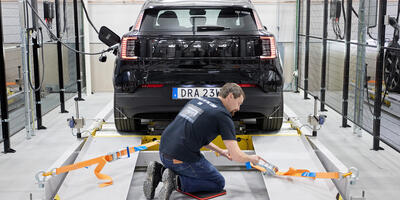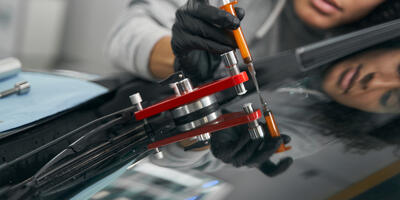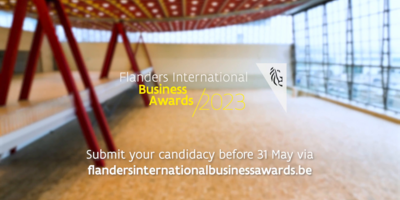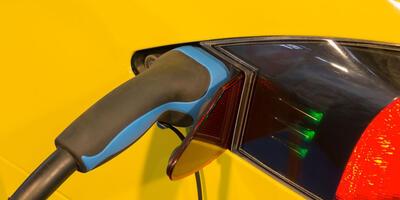
Automotive industry
For decades, the automotive industry has played an essential role in the economy of Flanders, Belgium’s northern region. High-quality cars, trucks, buses and other vehicles are assembled in Flanders and exported the world over from a unique, central location in Europe that has all the logistics, production and innovative expertise your automotive business will ever need.
Quick facts about Flanders’ automotive industry
Despite its relatively small size, Flanders buzzes with automotive activity, accounting for:
- 326 companies and 45,608 direct jobs
- EUR 14.4 billion in annual turnover
- an annual investment value of EUR 370 million
- EUR 3.1 billion in added value per year
- over 85% of Belgium's entire turnover in automotive
(Source: Agoria, 2022)
A road trip through Flanders’ automotive ecosystem
A broad range of automotive research and knowhow
At the core of Flanders’ automotive industry are two car assembly plants – Volvo (Ghent) and Audi (Brussels) – as well as bus and truck manufacturers Van Hool (Lier), VDL Bus & Coach (Roeselare), DAF Trucks (Temse) and Volvo Trucks (Ghent). Together with Flanders’ dense network of universities and market-driven research centers, they create the right climate for continuous innovation and pioneering R&D in the automotive sector.
Flanders Make: strategic research center with a heart for automotive
As one of Flanders’ strategic research centers, Flanders Make assists manufacturing companies in developing and optimizing their products and production processes. To this end, the research center offers research and innovation support, testing and validation services, and more.
What’s more, Flanders Make has a specific research track for motion-sensing products. Its aim? To develop and validate smart motion systems. Other automotive focal points include decision & control, design & optimization and flexible assembly.
Specialized academic knowledge and research centers
Various higher education institutes are your go-to partners for highly specialized and advanced automotive knowledge and expertise. Think of:
- Vives Hogeschool (in-vehicle networks)
- Karel de Grote Hogeschool (sustainable fuels)
- KU Leuven Campus Groep T (sustainable engineering, transport and mobility: e-vehicles, solar vehicles, biobased composite structures, etc.)
- KU Leuven (engineering dynamics, noise and vibration research, thermal and fluid technologies, etc.)
- Thomas More Campus De Nayer (alternative drivetrains)
Moreover, several of Flanders’ universities and university colleges have set up collaborative automotive research centers, such as:
- KU Leuven Materials Research Center (lightweight materials and materials processing in automotive)
- Thomas More Automotive Technology Center (for automotive testing and validation)
- VUB-MOBI (mobility, logistics and automotive technology research center)
Strong network and talent to lean on
In Flanders, your automotive firm is in good company. For starters, the vast majority of European and international automotive federations have their headquarters in Belgium and Flanders as region. These include ACEA, CLEPA, EARPA, FIGIEFA, EUROBAT, JAMA, EUCAR, EGVI, EAIVT, EATS, ETRMA and ETRTO.
What’s more, in Flanders, your automotive business can rely on a strong and motivated workforce that’s not just one of the world’s most productive but also multitalented and multilingual as well as highly trained and educated.
Some of this local talent has made it to the top of the international automotive design scene, working for leading brands such as Alfa Romeo, Ferrari, Ford, Audi, Volkswagen, Ford, Lotus Cars, Renault, Mitsubishi and more. Just think of world-famous automotive designers like Lowie Vermeersch, Dirk Van Braeckel, Pierre Leclerq, Steven Crijns, Thomas Bigwood and Luc Donckerwolke.
It should therefore come as no surprise that many of the world’s main automotive players operate production, logistics and/or R&D facilities in Flanders, including Volvo, Audi, DAF, VanHool, VDL, Fuel Link, Toyota, Hyundai, Honda, Mazda, etc. What’s more, these flagship firms are active alongside cutting-edge suppliers such as Continental, Bosch, Bombardier, Tremec, Dana, Tenneco, Bosal, Brose, Kautex, Plastal, Pullmaflex, etc.
Automotive logistics that gets things rolling
Flanders is situated right in the middle between Europe’s main motor vehicle production sites: a central position from which your automotive business can benefit greatly in terms of logistics, distribution and more. Flanders’ ports in particular play a crucial part in automotive logistics in Europe and the world:
- The Port of Antwerp-Bruges is Europe’s second-largest seaport and the world’s largest hub for handling finished vehicles based on deep-sea roll-on/roll-off volumes. It grants access to a well-oiled and finely tuned network of terminals, vehicle processing centers, equipment processing centers, car deck storage, railway-connected terminals and automotive transport firms. It also offers a broad range of value-added services such as pre-delivery inspection, washing, (de)waxing, painting, repairs, remarketing and more.
- North Sea Port Ghent is home to an interconnected automotive cluster of car and truck assembly firms, car distributers, producers, suppliers and more – not to mention Volvo Cars' largest assembly plant, Volvo Trucks’ biggest assembly factory and Honda’s European distribution center.
Financing your automotive business in Flanders
When deciding to establish activities or headquarters in Flanders, your automotive company can reap the rewards of:
- government subsidies and support for investments in R&D and innovation, strategic transformation, ecological efforts, growth and other domains
- tax incentives to fund a broad range of business activities
- fiscal options to help you cut labor costs
Request a free copy of our brochure to discover more about government support in Flanders.
Tax incentives for research-intensive activities
Flanders offers access to several tax incentives that are particularly relevant to research-intensive sectors like the automotive industry. Examples include:
- the innovation income deduction – up to 85% of a company’s net innovation income can be exempt from corporate tax.
- the R&D investment deduction – 13.5% of the investment value (at once) or 20.5% of the annual depreciation (staggered).
- the R&D payroll tax exemption – 80% of the withholding tax on professional income for researchers and academic personnel.
Interesting labor incentives
Some labor incentives and measures available in Flanders are particularly interesting for automotive players. Think of:
- Temporary economic unemployment – employers who cannot employ their workers on a normal basis for economic reasons do not have to pay wages for unemployment days. The Belgian Federal Employment Agency gives employees pay for those days of inactivity.
- Fiscal advantages for night or shift work – employers are excused from paying part of the advance tax payment that is deducted from their employees’ wages. This exemption amounts to 18% of the total taxable wages, including bonuses for working in shifts or night work.
